Finland logs third-warmest September in history, as Lapland temp shatters record

Finland’s Arctic may be best known for snow and Santa, but Lapland made headlines for something entirely different in September — record warmth.
September 2025 was Lapland’s warmest on record, and the country’s third-warmest September ever, the Finnish Meteorological Institute (FMI) said in a statement.
At the Tähtelä station in Sodankylä, an Arctic municipality, the average temperature was 11 C, making it the third consecutive record-warm September there as well.
“Climate change made the average temperature of September 2025 1.9 degrees higher and roughly 50 times more probable than if there were no climate change,” the FMI said. “The information is based on a peer-reviewed method by the Finnish Meteorological Institute and the University of Helsinki.”
Finland has weather data going back to the early 1900s, and shows that 2025 was among the warmest starts to autumn on record. The national average temperature for September was 11.9 C, just shy of the record highs set in 2023 and 2024.
Warmth spreads south
The unusual warmth was an equal-opportunity visitor across the country. Average temperatures ranged from about 15 C on the southern coast to around 10 C in northern Lapland, some 2–4 C above normal.
Central Lapland saw the strongest deviations.
There were four days when temperatures increased beyond 25 C , something the the FMI said was an unusually high number for so late in the year.
The highest temperature of 25.8 C was logged on Sept. 8 at the Kärkkä station in Salo, a city between Helsinki and Turku. The coldest was –5.4 C on Sept. 30 in Lappeenranta, in South Karelia.
Lightning-filled skies and uneven rains
Precipitation was mostly near normal, though parts of Central Finland and Northern Ostrobothnia were soaked by exceptionally heavy rain. The highest monthly total, 136.7 mm, was measured in Pudasjärvi’s Sarakylä, while Pulju in Kittilä — back in Lapland — had just 30.4 mm.
Along with record warmth, September lit up Finland’s skies with the most lightning strikes in more than two decades — 6,700 in total, more than double the average of 2,800.
Sunshine hours in the country ranged from 80 to 200, slightly above normal.
Questions, comments or story ideas? Contact Eilís at eilis.quinn(at)cbc.ca
Related stories from around the North:
Canada: New research links Yukon summertime heat to climate change, CBC News
Greenland: Alarming, above-average ice loss in Greenland due to rising temperatures, Eye on the Arctic
Norway: Svalbard glacier once survived a warmer climate, The Independent Barents Observer
Russia: Siberia’s 2020 heat wave left lasting impacts on Arctic, study finds, Eye on the Arctic
Sweden: Sweden and Finland urge revision of EU’s forestry climate targets, Reuters
United States: Bursting ice dam in Alaska highlights risks of glacial flooding around the globe, The Associated Press



